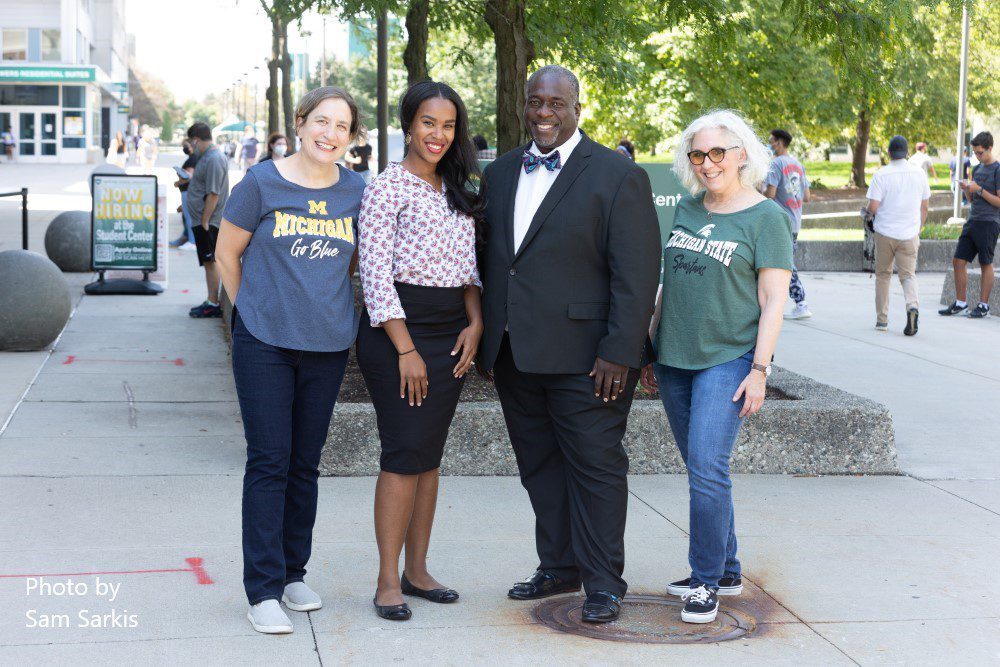
Roundup of Wow’s Best College Essay Coaching Tips
TABLE OF CONTENTS
- What Should Your Students Include in a First Draft of a College Essay?
- Best College Essay Coaching Tips to Help Your Students Stay on Task
- Advice to Manage Parent Expectations for College Essay Coaches
- How to Guide Your Students on the College Essay Supplements
Every month, Wow Writing Workshop CEO Susan Knoppow hosts a free 30-minute webinar, just for counselors and consultants. In this Pro Chat, she answers questions and shares tips to help pros support their students and their families through the college essay-writing process.
We get together one Wednesday a month, 1-1:30 p.m. Eastern.
These sessions are well attended. We share generously and answer a lot of questions. Here’s a roundup of the best material we have to offer meaningful answers to real questions from counselors like you.
What Should Students Include in a First Draft?
Q: What are five key things to include in a first draft to make it more effective?
A: There are not five key things! It’s important get out of the mindset that there are specific things that a draft should include. Every essay is different, and there’s no universal formula.
Q: How should you address a student’s concern that they don’t have a story to tell?
A: The first step of our 10-step process is to understand the prompt. This is essential to do before even brainstorming begins, as it frames all future work on the essay. Now, for most if not all essays, you won’t find anything in the college essay prompt that says to be unique. Students need to write stories that highlight a trait about them, not stories that are unique.
Q: What are your most effective brainstorming questions?
A: Before we ask students brainstorming questions, they need to have a story in mind. After that, we probe with questions like “Tell me about X” and “Tell me more about Y.” These prompt students to talk about their stories and understand why they may or may not make good essay topics. Why? is always a good question. Why did you do that? Why is something important to you?
Q: What ideas do you have for students focused entirely on academics or sports?
A: Every student has positive traits. Students don’t need to be multi-dimensional, fascinating people to have a story they can tell that highlights one or more of those traits. There’s no need to put pressure on yourself or on them to dig deep into their essence. Let them be who they are, and the story will come.
Q: Is it okay for students write about community service experience during the pandemic?
A: There’s no such thing as a topic you “should” or “shouldn’t” write. Any topic is okay if it demonstrates a positive characteristic, shows reflection, and, most importantly, answers the prompt. If a story about a food drive meets those criteria, go for it!
Best Tips to Help Your Students Stay on Task
Q: How do I motivate students who are dragging their feet close to a deadline?
A: Most of the time, if a student is dragging their feet near the finish line, it’s time for the essay to be done. When students have any type of issues writing, we ask ourselves whether the problem has to do with the student’s willingness or ability to get it done.
Pay attention to willingness and ability every step of the way. At Wow, we believe it is our job, and yours, to balance each student’s innate ability with their willingness to reflect, meet deadlines and focus.
If it’s a problem with the student’s ability, then the student can be done. The essays probably won’t improve that much, so it’s really okay if the student doesn’t write another draft.
If it’s a problem with the student’s willingness, it’s still worth letting the student be done, even if you wish the essay were better or different. It’s all a balancing act.
Q: How does a college essay coach help distracted students stay focused?
A: You can’t get rid of the distractions in a student’s life. Rather we recommend you lower your own expectations. At a certain point, a student is either going to finish their essay, or not, and if you push too hard, it may be more likely that they won’t!

It’s also important to recognize the difference between a college essay problem and non-college essay problem. Something that’s not an essay problem, like anxiety, is probably not something you’re qualified to help a student through. You can and should support your anxious students, but there’s only so much you can do to address a non-college essay problem.
Q: How do you motivate students who procrastinate?
A: Motivation is internal. It’s impossible for you to motivate a student on your own. The best you can do is develop strategies that help them help themselves, like keeping a clear deadline schedule throughout the essay writing process and holding your students accountable for these deadlines.
Q: Do you have any tips for creating a schedule?
A: Having exact dates that both you and the student are clear on and agree on from the beginning can go a long way. The timeline itself doesn’t matter as much, as long as you’re consistent and everyone’s on the same page. Try to get your student’s input as well, to empower them to meet the deadlines, and to make sure that the schedule works with everything else they have going on in their life.
Q: How can a college essay coach stay calm when students procrastinate?
A: This can be tricky! Try noticing something positive about the work the student has done up to this point. This can be grounding, and it can help you identify what is and isn’t possible in the time you have remaining. Also, remember that this is not your application and that a student procrastinating is not a reflection on you!
Q: What can a college essay coach help a student who is stuck get back on track?
A: We recommend asking the student when they will be ready to get back to work. Keep in mind that often, when a student is stuck, it’s the result of a non-college essay problem. You can try to work with them through a non-college essay problem, but you can’t (and aren’t qualified to) fix it. You’ll be wasting time, and theirs, trying to force them to complete a task that they’re either unable or unwilling to complete, so try to meet them on their terms.
Advice for Managing Parent Expectations
Q: A parent told me colleges look for specific strengths, not for well-rounded students. Is this true?
A: Whether or not colleges have a specific trait or strengths in mind is not the point. It’s not a good idea for any student to write an essay whose main purpose is to talk about some trait or strength the student thinks colleges are looking for. Students should focus on what they want colleges to know about them, not what they think colleges are looking for. Students should only write about traits and strengths that are real and genuine. If colleges have something specific in mind for college essays, that will emerge through a well-rounded application.
Q: How can I help a student who wants to impress the reader with big words/lofty theories?
A: Try to remind them that the purpose of an essay is to answer the prompt. The prompt does not ask your student to use big words or back up lofty theories. Nobody is sitting inside the admissions office and analyzing their work. Students should use the words they use every day!
They need to keep it real and sound like themselves. Admissions officers are reading for meaning. They’re reading for insight. That’s what they’re looking for, and that’s why they ask the questions that they ask.
Q: How can I manage parents who try to change the finished essay?
A: This is a tough one! But you can manage this with a process that includes communication with parents at the beginning. This type of situation can be tricky and is generally easier to avoid than to navigate directly.
Consider sending an email at the beginning of the essay-writing process with a student-articulated description of what they’re writing and why. Warn them against looking at the essay during the “messy middle,” since it’ll unfocused and confusing to an outsider. It can be worth sending another message either during or at the end of the process, outlining what you’re excited about regarding the essay and why. This should minimize the number of anxious, essay-altering parents you come across.
Q: How can I manage students who want to change their own finished essay?
A: Often, this is again the result of an outside source who has sown doubts in your student’s mind. Try reminding the student why their essay works already, pointing to specific parts of the work they’ve done. At this point in the process, this is an issue with the student’s nerves, not with the effectiveness of their essay.
Q: Do you, the coach, look up the supplemental essays yourself, or do you trust that the student did?
A: We look them up. We ask students to check them. If we know it’s a Common App school, we start with the Common App website, since we figure that’s the best resource. If they’re not there, then we do our best to find the hidden ones.
Related: College Admissions Officer Essay Tips
How to Guide Students on the College Essay Supplements
Q: How does a college essay coach help students answer the “Why This School? prompt?
A: We like to think of this like a dating essay: The school has all sorts of wonderful qualities; your student has all sorts of wonderful qualities. They don’t all overlap, but we create a Venn diagram to find the intersection. Keep in mind, not all “Why This School?” questions are the same. Often there are subtle differences between what different universities ask, so keep that in mind when helping your students answer the prompt.
Q: How do you help students stand out in the supplements with only a 150-word limit?
A: First of all, students don’t need to stand out in every essay. For your sake and for theirs, consider changing your expectations to match this fact. At the same time, it’s not necessarily any harder to stand out in a shorter essay compared to a longer one. A 150-word limit forces the student to be concise and have a specific answer to the prompt, which can be revealing.

Q: How should students answer the COVID-19 optional question?
A: Students, if they choose to answer the COVID-19 prompt, should be as honest as possible. Admissions officers don’t want to hear exaggerated, superhero stories. They simply want to know what the student did, what they couldn’t do, and how they felt about it.
Q: What’s the best way to help kids recycle supplemental essays for colleges with similar prompts?
A: When adapting one essay to meet another’s requirement, Wow has a process. Our coaches look at the essay the student already wrote, look at the new prompt, and before assigning any writing ask: “How is this prompt different from the one you already answered?”
Consider follow-up questions like these: “How will this new essay be different?” or “What else do you have to change to make the essay you already have work for the new prompt?”
Look at those essays and identify which elements the student can include and which element they can modify. This teaches the student to think about why they put that information in their essays in the first place and is more effective than sitting down and trying to rework an old essay all at once.
Q: What makes the UC personal insight questions different from other college prompts?

A: Here’s a secret: They’re not so different! Not substantially, anyway. Yes, there are more prompts than the average college, and yes, each essay can only be up to 350 words. But answering the PIQs is essentially the same as writing any other personal statement essay. This means that you and your students should follow the same processes that you always do, instead of feeling that this is an entirely unfamiliar challenge.
Q: How to choose the four topics for the UC PIQs? Should you just let the student choose?
A: Yes, ultimately, the student should choose which four topics to write about in an answer to a UC personal insight question. (The student should always choose their own topic for any college essay!) If a prompt doesn’t resonate with them, then they shouldn’t write on it. Your job in the selection process is to help the student understand the prompts and the nuances between them. This can help them choose more easily and will help them choose a specific topic to write about later.
Q: Do you brainstorm all four UC PIQs with students at once?
A: Often, ideas for multiple different essays come out during a single brainstorm session. Make note of these ideas during the brainstorming process, but don’t try to write all four UC essays at once. Once you finish one essay, go back to your brainstorming notes, and see if you have any easy jumping off points for another.
Watch the current Pro Chat here.
Sign up for the next Pro Chat here.
Learn more about Wow’s professional training options here.


